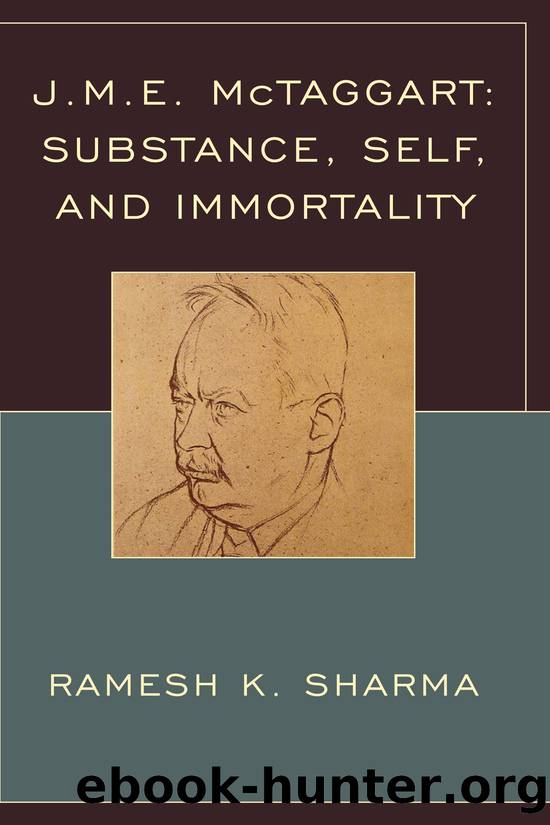Wartime Culture in Guilin, 1938â1944 by Zhu Pingchao;

Author:Zhu, Pingchao;
Language: eng
Format: epub
Publisher: Lexington Books
Chapter 8
Selves and the Absolute
The stage is now clearly set for the idea of the Absolute to enter into the picture and force reason to reflect upon it. McTaggart swears by reason no end, notwithstanding that he is said to have had mystical experiencesâcalled by himself a âsaul feelingââfrom time to time. Indeed, McTaggart strove hard not to allow his mystical vision of REALITY as such to overwhelm him so as to dictate terms to his rational consciousness, which according to him consisted, minimally, in defending through argument and even a priori reasoning what one believed about the fundamental nature of reality. Kantian skepticism about any attempt to know such as a thing as God, or soul, or things-in-themselves notwithstanding, postulation of an absolute has been integral to many a system of metaphysics, including the idealistic ones, whether before or after Kant. Different philosophers have been led up to the Absolute by different arguments and by different routes, and these have depended in no small measure upon the ultimate status that finite reality, specially finite individuals, hold within the system in question. Of course there seems to have been some consensus on at least some of the features of the Absolute. That the Absolute is absolutely real; that it is a spiritual unity; that it is all-inclusive and so a whole or totality; and that it is unconditioned and infiniteÂâemphases such as these are generally acceptable to the protagonists of the idea of the Absolute, even if opinion has diverged on the meaning of the terms involved. With some thinkers againâSpinoza, Hegel, Shelling, and subsequently, Lotze, Bradley and Bosanquetâthe Absolute has been the highest reality and concern with it a primary metaphysical concern. Thus a recent scholar Frederick Beiser writes about Hegel in his essay titled âHegel and the problem of metaphysicsâ:
[Hegel] had a conception of philosophy that can only be described as âmetaphysical.â In his early Jena years, and indeed throughout his career, Hegel saw the purpose of philosophy as the rational knowledge of the absolute. This conforms to one of the classical senses of the term âmetaphysics,â a sense given to it by Kant in the Critique of Pure Reason: the attempt to know the unconditioned through pure reason.1
It is also known that some thinkers preach, in one way or other, the doctrine of âdegrees of realityâ which, among other things, provides the basis2 of their discourse of the Absolute. But lest this picture mislead one into reading too much in the limited agreement found among some (foremost) philosophers, it must be mentioned that major difficulties have shadowed monistic idealism in the past on the question of the ultimate status of the finite self, and the blending or coalescence of these selves in the Absolute. While some have gone to the length of looking upon separate individuals as transitory, inadequate and precarious appearances, which are âadjectivalâ to the Real,3 or, as Hegel said, a moment, trace, or shading in the whole, some others have emphasized the ultimate character of each individual as a âfocalizationâ of the universe which is nowhere exactly repeated.
Download
This site does not store any files on its server. We only index and link to content provided by other sites. Please contact the content providers to delete copyright contents if any and email us, we'll remove relevant links or contents immediately.
The Vikings: Conquering England, France, and Ireland by Wernick Robert(79224)
Ali Pasha, Lion of Ioannina by Eugenia Russell & Eugenia Russell(39942)
The Vikings: Discoverers of a New World by Wernick Robert(36831)
The Conquerors (The Winning of America Series Book 3) by Eckert Allan W(36716)
Cecilia; Or, Memoirs of an Heiress — Volume 1 by Fanny Burney(32095)
Cecilia; Or, Memoirs of an Heiress — Volume 3 by Fanny Burney(31482)
Cecilia; Or, Memoirs of an Heiress — Volume 2 by Fanny Burney(31436)
Empire of the Sikhs by Patwant Singh(22780)
Hans Sturm: A Soldier's Odyssey on the Eastern Front by Gordon Williamson(18341)
The Secret History by Donna Tartt(18269)
Cat's cradle by Kurt Vonnegut(14806)
Sapiens: A Brief History of Humankind by Yuval Noah Harari(14006)
Pimp by Iceberg Slim(13828)
Talking to Strangers by Malcolm Gladwell(12916)
Norse Mythology by Gaiman Neil(12880)
Leonardo da Vinci by Walter Isaacson(12834)
Underground: A Human History of the Worlds Beneath Our Feet by Will Hunt(11857)
4 3 2 1: A Novel by Paul Auster(11843)
The Radium Girls by Kate Moore(11652)
